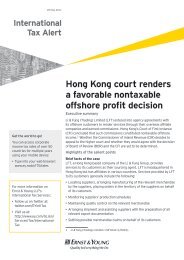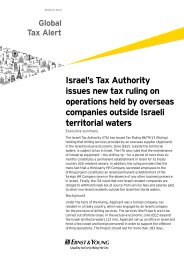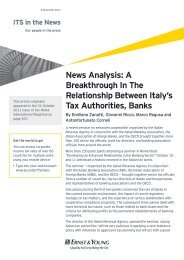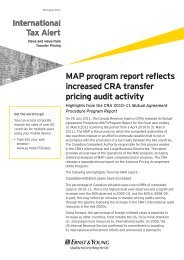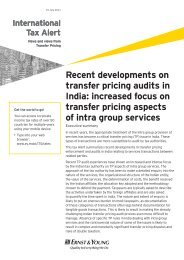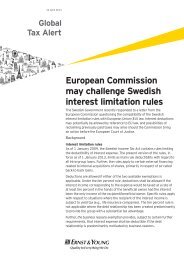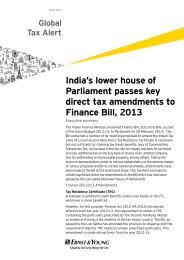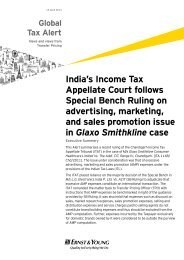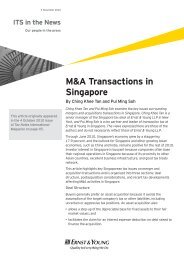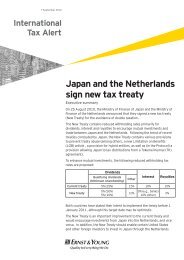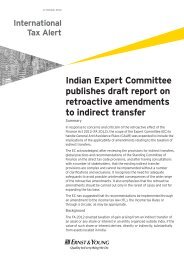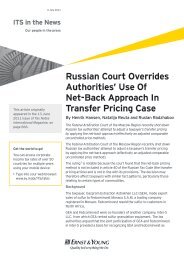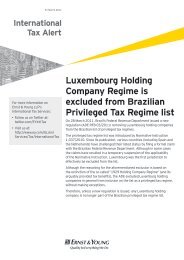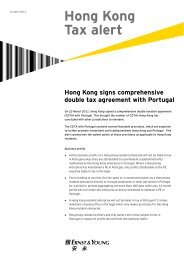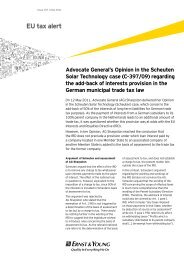(GST) compliance obligations (pdf, 5.62 MB) - Ernst & Young T ...
(GST) compliance obligations (pdf, 5.62 MB) - Ernst & Young T ...
(GST) compliance obligations (pdf, 5.62 MB) - Ernst & Young T ...
You also want an ePaper? Increase the reach of your titles
YUMPU automatically turns print PDFs into web optimized ePapers that Google loves.
Tax administration viewpoint<br />
Prenesh Ramphal, Senior Manager of VAT Research and<br />
Development, South African Revenue Service (SARS), talks<br />
about aspects of tax administration help to improve the<br />
taxpayer/tax authority relationship:<br />
“On the corporate side, I would say SARS has a generally<br />
good relationship with taxpayers. I’m glad to say that<br />
SARS does engage and affords appropriate attention to<br />
the issues coming out of the stakeholder engagement<br />
forums. We have a good public participation process in<br />
the tax legislation proposals, which has its roots in our<br />
Parliamentary Budget tax proposal announcements.<br />
Issues relating to Tax Policy are publicly shared inviting<br />
participation with SARS.”<br />
“Our Large Business Centre monitors trends of taxpayer<br />
behaviour within the various business sectors. If a material<br />
deviation is noted, the taxpayer relationship manager<br />
interacts with the tax manager in that particular corporate<br />
in order to establish reasons for that deviation. This<br />
is to get a feel of what’s going on without necessarily<br />
scrutinising the books of account. SARS therefore does<br />
not overburden the corporates with requests for audit,<br />
but try and maintain a level of risk profiling that provides<br />
information which can be re-acted to. In that respect<br />
there is already a light touch approach on a corporate<br />
taxpayer. The risk is determined without actually imposing<br />
on corporate’s the burden of perpetual audits. There are<br />
instances, of course, where corporates are identified for<br />
a full VAT audit which usually occurs due to the high risk<br />
nature.”<br />
“We also have minimal instances of VAT disputes which are<br />
taken to litigation. We also have an alternative dispute<br />
resolution process which means a tax dispute can be<br />
resolved without the need to formally litigate. I think that<br />
also helps in reducing the VAT administrative burden and<br />
the associated costs of litigation.”<br />
33 VAT and <strong>GST</strong>: multiple burdens for multinational companies<br />
“Unless it’s a case of fraud or deliberate underpayment, most<br />
taxpayers can opt for an alternative dispute resolution<br />
process. The majority of the taxpayers, in my view, we will<br />
seek to come to a resolution on the matter. The two parties,<br />
through a facilitator will attempt to resolve the issues at<br />
tax administration level. Dispute cases are resolved more<br />
quickly as well. Issues pertaining to tax principle and issues<br />
of fact, are generally not referred to alternative dispute<br />
resolution. Majority of the dispute cases follow the route<br />
of alternative dispute resolution process — because both<br />
taxpayers and SARS see the benefits of the process.”<br />
“We also have a VAT ruling regime that provides certainty<br />
and clarity in respect of the application of the legislation.<br />
SARS has two types of rulings regimes. The first one is the<br />
advance tax ruling where for example, corporate wishes to<br />
enter into a multinational contract and can obtain certainty<br />
and clarity in advance on the tax implications of that<br />
contract. This ruling binds SARS. There is an application<br />
fee and a cost recovery fee based on time spent by a tax<br />
specialist on the matter. The second rulings regime is for<br />
historic transactions which a taxpayer may require for<br />
purposes of self assessment and disclosure to SARS. We<br />
also have a standard turn-around time within which an<br />
applicant can expect a ruling to be issued. Corporate’s find<br />
these ruling regimes to be effective and efficient.”<br />
“Experience shows that taxpayer engagement is important<br />
in order to obtain all the facts so that the ruling issued will<br />
not cause distress to the taxpayer.“



